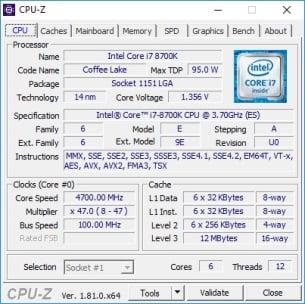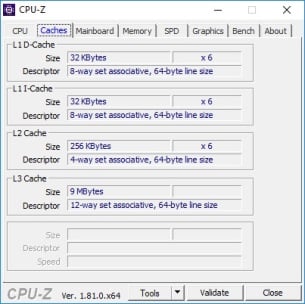Intel Core i7-8700K And Core i5-8400 Review: Coffee Lake - More Cores, Performance And Value
Intel was at the ready with a host of ultra-high-end processors – namely the Core X series – that allow the company to lay claim to the fastest desktop processor on the market. And now it’s time for Intel to re-shape its mainstream CPU line-up and target the Ryzen 7/5/3 series with a re-vamped family of processors that significantly shake things up.
We’ve got the flagship Coffee Lake-based Core i7-8700K on hand, along with its somewhat less capable sibling, the Core i5-8400. Both of these processors feature six physical cores, support for faster memory speeds, and leverage a fresh platform that’s been tweaked for more robust power delivery and, ultimately, more performance. Take a look at the 8th Generation Core i7/i5/i3 processors main features and specifications below and then we’ll dive in a little deeper with an array of benchmarks and overclocking. By the end, Intel may have you re-thinking your next desktop upgrade...
|
Intel shifts its mainstream processor segment into high gear with Coffee Lake. As you can see, the Core i3 series has been upgraded and features true quad-core configurations now, with clock speeds up to 4GHz and support for DDR4-2400 memory. 8th Gen Core i5 processors feature six-cores, with clocks up to 4.3GHz, and support for even faster DDR4-2666 memory. And the 8th Gen Core i7-series is now comprised of six-core processors as well, with support for 12 threads thanks to HyperThreading, clocks up to 4.7GHz, and DDR4-2666 memory. Essentially, the entire line-up gains a couple of physical cores over the 7th Generation Core series processors based on Kaby Lake, in addition to official support for faster memory.
The microarchitecture of the Coffee Lake-based 8th Generation Core processors is mostly unchanged from Kaby Lake. Although there are 10nm processors coming down the pipeline from Intel, the processors we are showing you here are built on Intel’s 14nm process node. Core functionality is unchanged – there are just more cores on-board, along with additional cache. Intel, however, has fine-tuned its manufacturing process to optimize efficiency and frequencies, tweaked clocks and turbo mode behavior for the line-up, and re-jiggered power delivery to the socket in a move to enhance turbo boost performance and stability at overclocked frequencies.
The Coffee Lake-based 8th Generation Core processors use the same LGA1151 socket as the 7th Generation, but they are not interchangeable. Kaby Lake-based 7th Generation Core processors will not work in newer Z370-based motherboards designed for Coffee Lake. Intel claims the new power delivery scheme isn’t cross-compatible, but it remains to be seen what Intel’s motherboard partners pull-off over time.
The Core i7-8700K supplants in the Core i7-7700K in Intel’s premium consumer processor series. Unlike the 2nd – 7th generations, however, which were all quad-cores, this latest part is a 6C/12T beast, with a base clock of 3.7GHz and boost clock of 4.7GHz. There is 12MB of Intel Smart Cache on-board, along with Intel UHD graphics and support for an array of technologies, like Optane Memory, AVX2, QuickSync, etc. Although the CPU engine has been significantly upgraded over the previous generation thanks to the additional cores, the graphics engine is mostly unchanged. 8th Generation Core processors feature the same HD 630 graphics engine as previous models, though support for faster memory speeds and a dynamic frequency up to 1.2GHz on the Core i7 give graphics a slight kick. Then again, if you buy a Core i7-8700K and use integrated graphics we probably shouldn’t be friends.
The Core i5-8400 features the same physical die, but has only 9MB of Smart Cache enabled and Hyper-Threading has been disabled. The Core i5-8400 has a base clock of 2.8GHz and a boost clock of 4GHz. Since this is a non-K SKU, it is not unlocked for easy overclocking, however. This is an important distinction enthusiasts must make when considering a mainstream system. All of AMD’s desktop processors are unlocked. Intel is still segmenting its processors with locked and un-locked models.















